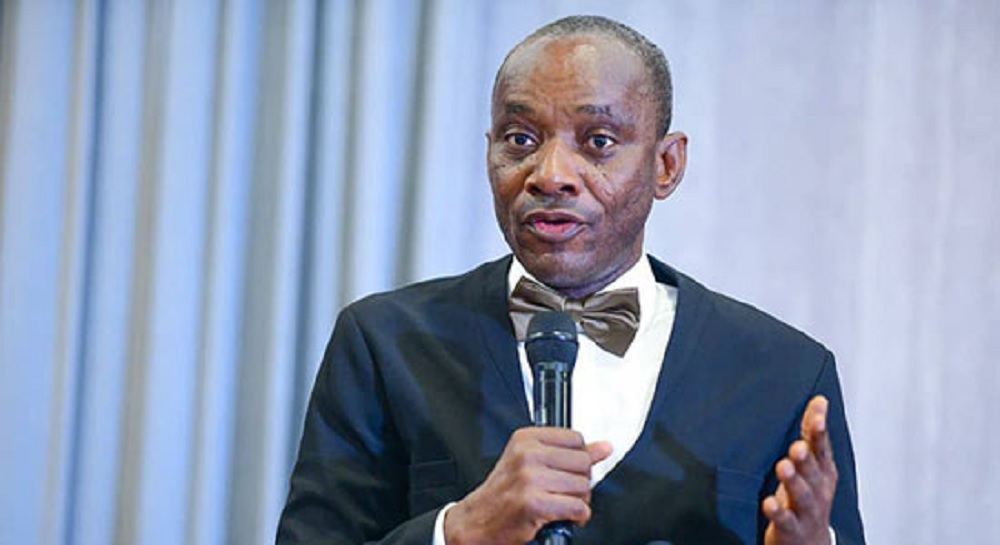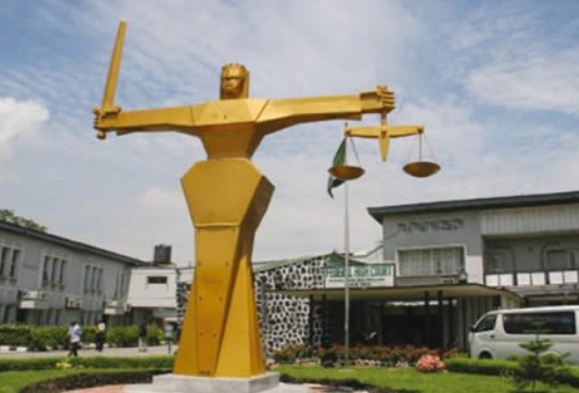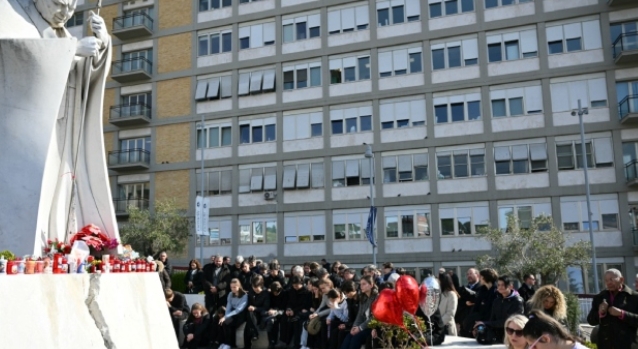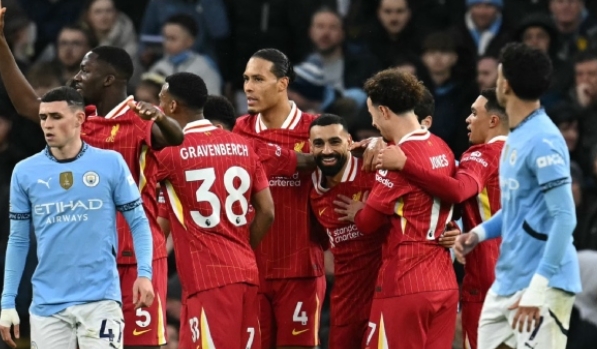News
Sam Amadi to deliver 6th JFCN annual lecture

Dr. Sam Amadi, a former Chairman of the Nigerian Electricity Regulatory Commission(NERC), is the Guest Speaker at the 6th Annual lecture of Just Friends Club of Nigeria which holds at Bolingo Hotel, Abuja on Tuesday, November 5, 2024. The time of the event is 10 am.
A statement by the club’s President, Mr. Fred Ohwahwa,stated that the topic of Dr. Amadi’s lecture is: “ HIGH COST OF GOVERNANCE AS AN IMPEDIMENT TO DEVELOPMENT.”
Dr. Amadi is currently the Director of Abuja School of Social and Political Thought and a Visiting Professor at the Emerald Energy Institute at the University of Port Harcourt.
He holds a research doctorate degree (SJD) in Law from Harvard University, Cambridge, Massachusetts (2004), a Master of Public Administration (MPA) {2003} and a Master’s in Law (LL.M (2001) from the same institution. He has an LL.B. from the University of Calabar, in 1992. He was called to the Nigerian Bar in 1993 after passing from the Nigerian Law School.
The Chairman of the 6th JFCN Annual Lecture is a former Executive Director (Programmes) of Nigerian Television Authority(NTA) and former Director General of National Lottery Regulatory Commission, Olorogun Peter Igho.
The panelists are Dr. Ahmed Adamu, an associate professor and a petroleum economist at Nile University, Abuja; Dr. Felix Oisamoje, an adjunct Senior Lecturer of Mass Communications at Bingham University, Keffi; and Mr. Maxwell Kadiri of Open Society Justice Initiative.
The Master of Ceremony is Mrs. Eugenia Abu, a broadcast journalist, writer, poet and media consultant, best known as a former News Anchor and Correspondent for NTA.
It would be recalled that the Guest Speaker at the inaugural Annual Lecture was Mr. Benjamin Ezra Dikki, then Director General of the Bureau of Public Enterprises. Dikki spoke on “The Federal Government’s Privatization and Economic Reform Programme.” The Guest Speaker at the 2nd JFCN Annual Lecture was Mr. Tony Ejinkeonye, then President, Abuja Chamber of Commerce & Industry, who spoke on “the Role of the Private Sector in FCT Development.”
The 3rd JFCN Annual Lecture had Dr. Abraham Nwankwo, a former Director General of Debt Management Office, as Guest Speaker and his topic was “Realism and Paradox in Financing Nigeria’s Huge Infrastructure Needs.” The 4th JFCN Annual lecture had Rev. Father George Ehusani as Guest Speaker.His topic was “Beyond The 2023 Elections: That Nigeria May Be Saved.” A former Chairman of the National Human Rights Commission (NHRC), Prof. Chidi Anslem Odinkalu, was the Guest Speaker at the 5th JFCN Annual Lecture. His topic was “Resetting Nigeria.”
JFCN is a socio-cultural organisation that fosters and encourages the spirit of oneness, companionship and comradeship amongst members and between the club and other friendly associations. The club is also involved in recreation, sports and engages in acts of philanthropy in favour of the needy members of the society at large. Its members are professionals in engineering, communication, accounting, business, legal and other sectors of the economy.
News
Court orders reinstatement of fired Lagos Assembly Clerk, Onafeko

By Kayode Sanni-Arewa
The National Industrial Court sitting in Lagos has ordered the reinstatement of the fired Clerk of the Lagos State House of Assembly, Olalekan Onafeko.
The order follows an ex parte application to the Court made by Onafeko through his counsel, Yusuf Nurudeen, in a case he filed against Lagos State Government, Lagos State Civil Service Commission, Lagos State House of Assembly Service Commission, The Speaker, Lagos State House of Assembly, Attorney-General of Lagos State and Mr. Ottun Babatunde.
Onafeko was the Clerk of the House before January 13 when Hon. Mudashiru Ajayi Obasa was removed as Speaker, with the then Deputy Speaker, Mojisola Lasbat Meranda elected as the new Speaker.
Obasa’s removal, a decision that sparked controversy within the Lagos House and the ruling All Progressives Congress (APC), also led to Onafeko losing his position, with Babatunde Ottun appointed as his acting replacement.
The claimant in the suit marked: NICN/LA/23/2025 sought for an interim injunction restraining the six defendants from parading any individual including Babatunde as the clerk pending the hearing of the motion on notice for Interlocutory injunction already filed in the suit.
Granting the application, Justice M. N. Esowe in an ex parte order directed that Babatunde should cease to parade himself as Clerk
Esowe ordered that that what was in place in terms of the person in the saddle of the Clerk Office prior to the crisis rocking the House of Assembly should now prevail.
“That both parties shall maintain the peace and status quo ante bellum until the motion on notice is heard and determined,” Esowe ordered.
The judge slated the hearing of the motion on notice for March 3, 2024.
News
Worldwide Prayers For ‘Critically’ Sick Pope Francis

By Kayode Sanni-Arewa
Pope Francis spent his tenth day in hospital Sunday as Catholics around the world prayed for his recovery, the day after the Vatican warned the 88-year-old’s condition was “critical”.
The Argentine pontiff, who is being treated for double pneumonia, suffered a prolonged asthma-style attack on Saturday and required blood transfusions for a low platelet count.
On Sunday morning the Holy See said “the night passed peacefully, the pope rested” — indicating no repeat of the crisis the previous day, Vatican sources said.
But Francis, who had part of a lung removed when he was a young man, is still receiving oxygen through a tube in his nostrils in the papal suite at Rome’s Gemelli hospital.
In a message published Sunday but written in the past few days, the Jesuit thanked hospital staff and said he had confidence in his treatment.
“I am confidently continuing my hospitalisation at the Gemelli Hospital, carrying on with the necessary treatment — and rest is also part of the therapy!” he said.
“I ask you to pray for me,” he concluded in the text published in lieu of his weekly Sunday Angelus, which he normally delivers from a window overlooking St Peter’s Square.
People pray at the feet of a statue of John Paul II outside the Gemelli hospital where Pope Francis is hospitalized for pneumonia in Rome on February 23, 2025. (Photo by Alberto PIZZOLI / AFP)
Francis, who has been head of the Catholic Church since 2013, was admitted on February 14 initially with bronchitis, but his condition has deteriorated since then.
In its evening update Saturday, the Vatican warned his “condition continues to be critical, therefore the pope is not out of danger”.
It said Francis was alert and “spent the day in an armchair even if he was suffering more than” the day before.
It said he had a “prolonged asthmatic respiratory crisis, which also required the application of high-flow oxygen”.
Daily blood tests also “showed thrombocytopenia, associated with anaemia, which required the administration of blood transfusions”, it added.
Thrombocytopenia is a condition that occurs when the platelet count in the blood is too low, which can cause trouble stopping bleeding.
Blood or platelet transfusions, delivered via an intravenous (IV) line, are given to people who are either bleeding heavily or at very high risk of bleeding, according to the US National Institutes of Health (NIH).
“The pope gets worse,” headlined Italy’s Corriere della Sera newspaper on Sunday, while La Repubblica described it as the “darkest day” at the Vatican.
Well-wishers have been leaving candles outside the Gemelli since Francis was admitted, and a special mass was planned for Sunday evening in Rome.
“I am praying for him, for his health, because he is a special person for all of us,” Italian teacher Ilde Zito told AFP at the hospital.
Prayers and messages of solidarity also came in from among the almost 1.4 billion Catholics across the globe, alongside other Christians and world leaders.
In the cathedral of Buenos Aires, where Francis was once archbishop, TV screens at the entrance showed images of then Jorge Bergoglio’s good works, and the priest held a special mass.
“He is strong, he has always been strong, but there is nature. I know he is very ill and old. I hope he recovers, but it makes me sad,” Hector Armando Diaz, 76, a retired sales clerk, told AFP there.
Across the world in Iraq’s northern city of Mosul, a former bastion of the Islamic State group that Francis visited in 2021, at least a dozen churches also held prayers for him.
“This is the least we can do to express our solidarity, love, and appreciation for this great person,” said university professor Adnan Hadi.
Mexico’s president, Claudia Sheinbaum, offered her hopes on social media for a speedy recovery for the “great humanist” Francis, the first pope from the Americas.
Francis’s continued hospitalisation has sparked huge concern about his health but also speculation about whether he might step down.
He has always left the door open to following his predecessor, Benedict XVI, who in 2013 became the first pope since the Middle Ages to resign.
But he has repeatedly said it was not the time.

The pope maintains a punishing work schedule. He carried out a mammoth 12-day tour to the Asia-Pacific in September, but has suffered increasing health issues.
He underwent colon surgery in 2021 and an operation for a hernia two years later. He is overweight and has constant hip and knee pain, which forces him to use a wheelchair.
AFP
News
Liverpool thrash Man City, Go 11 Points Clear

By Kayode Sanni-Arewa
Liverpool took a big step to winning the Premier League, crushing an uninspiring Manchester City in a showdown on Sunday.
Mohamed Salah stole the show, scoring one and providing an assist to send Liverpool 11 points clear at the top of the table although they have played a game more.
The Egyptian opened the scoring with his 30th goal of the season before setting up Dominik Szoboszlai to double the lead before half-time.
Just days after exiting the Champions League to Real Madrid, this was another sobering defeat for the dethroned English champions, who are now 20 points adrift of the leaders.
So often during Pep Guardiola’s glorious reign, Liverpool have come up just short in English football’s great rivalry of recent years.
However, their time to match Manchester United’s record of 20 English top-flight titles now appears just months away in Arne Slot’s first season in charge.
Arsenal’s shock 1-0 home defeat to West Ham on Saturday had eased the pressure on Liverpool, that had built after dropping points in two of their last three games at Everton and Aston Villa.
A trip to the Etihad has for so long been the stiffest test of all, but City’s defensive frailties were easily exposed and they also badly missed the presence of the injured Erling Haaland in attack.
Liverpool, by contrast, had their talisman fit and firing as Salah took his staggering tally this season to 25 goals and 16 assists in 27 Premier League appearances.
However, their time to match Manchester United’s record of 20 English top-flight titles now appears just months away in Arne Slot’s first season in charge.
Arsenal’s shock 1-0 home defeat to West Ham on Saturday had eased the pressure on Liverpool, that had built after dropping points in two of their last three games at Everton and Aston Villa.
A trip to the Etihad has for so long been the stiffest test of all, but City’s defensive frailties were easily exposed and they also badly missed the presence of the injured Erling Haaland in attack.
Liverpool, by contrast, had their talisman fit and firing as Salah took his staggering tally this season to 25 goals and 16 assists in 27 Premier League appearances.
The Egyptian fired the visitors in front on 14 minutes thanks to a brilliantly executed set-piece routine.
Alexis Mac Allister’s corner was flicked by Szoboszlai into Salah’s path and his shot deflected off Nathan Ake past the despairing dive of Ederson.
At the other end, City’s own Egyptian international showed his ability to finish, but Omar Marmoush had strayed offside before being played in by Phil Foden.
City winger Jeremy Doku was skipping past Trent Alexander-Arnold at will, yet the Belgian consistently failed to deliver a telling cross or shot.
Salah was not so forgiving as he raced onto a long ball over the top and teed up Szoboszlai to wrong-foot Ederson.
The final outcome could have been much more humiliating for City had Liverpool had been as accurate on the counter-attack after the break.
Curtis Jones had a third goal ruled out by a VAR review for offside after Szoboszlai just failed to time his run through the heart of the City defence.
Ederson was forced into a stunning save from Luis Diaz and only a brilliant last-ditch tackle from Abdukodir Khusanov denied Szoboszlai a second.
Marmoush scored a hat-trick in last weekend’s 4-0 win over Newcastle and remained a lively threat as he flashed another effort across the front of Alisson Becker’s goal.
But City lacked the end product to make nearly 70 percent possession count.
Despite an eighth league defeat of the season, Guardiola’s men remain in fourth and will be confident of securing their place in the Champions League next season with a top-five finish likely to be enough.
However, after an unprecedented run of four consecutive titles, City look like yesterday’s team with Liverpool now champions in waiting.
-

 Metro20 hours ago
Metro20 hours agoInsecurity! Gunmen invade church, slash pastor’s 2 fingers
-

 Metro20 hours ago
Metro20 hours agoFire engulfs MTN office in Oyo
-

 Foreign20 hours ago
Foreign20 hours agoPentagon set to sack 5400 staff as attack hits Trump’s downsizing plan
-

 Metro20 hours ago
Metro20 hours agoDanger averted as police rescued six kids from collapsed building
-

 Sports20 hours ago
Sports20 hours agoAtalanta coach makes a U-turn says he never knew his comment could offend Lookman
-

 News19 hours ago
News19 hours agoNSCDC, Tantita intensify joint efforts to combat oil theft in Niger Delta
-

 News12 hours ago
News12 hours agoREVEALED! Gov Fubara Accused of Paying N4.8Bn Monthly to Ikenga Ugochinyere
-

 Sports20 hours ago
Sports20 hours agoEnd of road for Arsenal, may not win any shield this season – Report







